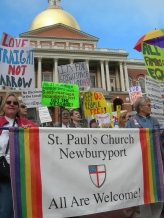Home » Religion
Category Archives: Religion
The Progressive Church

from philocites on flickr
A few decades ago, it would have been unthinkable for a woman to be a priest. A few years ago, It would be unfathomable for there to be a gay bishop elected in a national protestant church. A few weeks ago, it would seem unbelievable that a pope in the Catholic Church would have kind words for gay and lesbian people.
Today is a new day.
Things change, and churches are beginning to realize that they need to take a ride on that train.
Women
The Episcopal Church first began ordaining women regularly in 1977. The Rev. Jacqueline Means was the first woman in the Episcopal Church welcomed into the priesthood. Her ordination wasn’t welcomed by all. A priest on behalf of the American Church Union issued a bitter response: “We condemn this proceeding as opposed to the mind of the church and the will of God.” This sad remark of sexism clothed in religion was not out of the ordinary, and women still are fighting for respect. But many strides have since been made.
Most recently, the Evangelical Lutheran Church in America elected their first female presiding bishop. The Rev. Elizabeth Eaton surprised many by winning a narrow election against the current presiding bishop of 12 years, Mark Hanson, who was expected to win a third term. Katherin Jefferts Schori, in 2006, was elected to be the archbishop of the Episcopal Church. Like Rev. Eaton, Katherine Jefferts Schori was the first woman elected as archbishop of The Episcopal Church.
Gays and Lesbians
Homosexuality is by far one of the most controversial topics that Christian churches of any denomination are faced with. Even today, many conservative denominations and parishes denounce homosexuality as being against the word of God (thanks in part to former Growing Pains star-turned Evangelical Zealot Kirk Cameron).
Although most churches are far from where they need to be in the realm of homosexuality and acceptance, some progressive strides are deserving of praise.
First, consider the remarks of the newly elected Pope of the Catholic Church, Pope Francis. The Pope caught fire and praise recently for these remarks: “If someone is gay and he searches for the Lord and has good will, who am I to judge?”
This surprising amount of tolerance, as the New York Times points out, is almost polar opposite of Francis’ predecessor, Pope Benedict XVI, who was known to characterize homosexuality as an “intrinsic moral evil.” Are Pope Francis’ remarks enough to usher in a tide of support for homosexuality in the Catholic Church. Of course not. Not by a long shot. But for a church that carries the stigma of being allergic to change and progress, Pope Francis took a bold and impressive step forward. These remarks were considered surprisingly tolerant to some considering Francis’ past history
One of the more notable strides that a church has made toward acceptance of homosexuality occurred in 2003 with the election of Rev. Gene Robinson as bishop of The Episcopal Diocese of New Hampshire. Bishop Robinson’s election sparked a heated debate and garnered attention from the national news media. in their 2003 General Convention, the Episcopal Church consented to the election. This was the first time in the Episcopal Church’s history that an openly-gay person was elected as bishop.
In 2012, the Episcopal Church became the largest Christian denomination to approve same-sex marriage blessings. These bold moves have not come without cost for the global Anglican Communion. In the United States, several dioceses have left the church due to their indifference toward the national church’s stance on homosexuality.
This is just a small sampling from three different denominations/branches of the Christian church who have begun to make strides toward equality. Progressive religion can sometimes sound like an oxymoron, and many evangelical denominations perpetuate that myth. Shunning of homosexuality, preventing women from serving as priests, and a general absence of modern equality standards still plague the Christian community today.
These churches have not done enough to usher in an age of non-discrimination, but they are making great strides.
